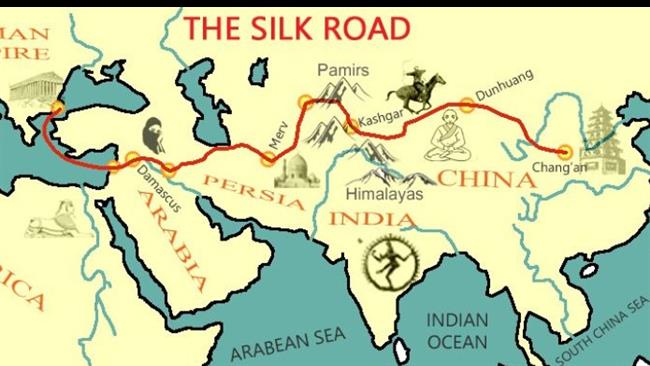Hindustani78
BANNED

- Joined
- Apr 8, 2014
- Messages
- 40,471
- Reaction score
- -47
- Country
- Location
In this March 2017 photo, workers leave the Badaling Great Wall high-speed railway tunnel in Badaling, northwest of Beijing, China. | Photo Credit: Reuters
http://www.thehindu.com/news/intern...he-one-belt-one-road-plan/article17821743.ece
The construction at Badaling is part of a strategic project, integrated with the Belt and Road Initiative — China’s giant connectivity project
By March end, Cherry blossom trees in Beijing, after a long winter, erupt into a riot of pleasing colours, adorning imperial gardens, sidewalks and residential compounds.
This year, however, for factors not so well known, the Badaling section of the Great Wall, on the outskirts of the Chinese capital experienced heavy snowfall. But amid the swirling flurries of snow, the loud clanking of metal and the steady hum of heavy machinery, announced that much more was happening beneath the ground, on the edge of the Wall.
Not far from where legions of tourists climb up the steps of China’s famous icon, railway engineers are working overtime to build an underground station at Badaling. Work is in full swing as the 174 kilometre section of high-speed railway, starting from Beijing north station has to be completed by 2022. That is the year when China will host the much anticipated Winter Olympics. Feeder lines from the high-speed station will carry tourists and sport enthusiasts to Zhangjiakou, one of the major sites of the games.
Belt and Road Initiative
“The work is particularly challenging as this will be the first underground high-speed railway station in China,” says Yang Lei, Director of the office of Key Projects, undertaken by China Railway Group Limited (CREC), the giant company that has been contracted for this work. She adds, “We have to dig to over 300 metres beneath the ground, to ensure that the vibrations do not cause damage to the Wall, apart from other technical considerations.”
The construction at Badaling is part of a strategic project, integrated with the Belt and Road Initiative (BRI) — China’s giant connectivity project, mostly along the ancient Silk Road which, in the past connected Asia with Europe.
Officials at CREC say that the 174-kilometre section is part of China’s north-west high-speed corridor, which will link Beijing with Lanzhou, a city along the Yellow river in north-central China. In turn, Lanzhou has already established a high-speed link with Urumqi, capital of the Xinjiang region, China’s gateway to Central and South Asia. Once the Beijing-Lanzhou high-speed section is complete, it will be possible to travel from the Chinese capital to Xinjiang’s administrative hub in 17 hours flat.
Highest high-speed rail track in the world
Apart from serving as the entrepôt to Central Asia, Xinjiang is also vital for the China’s energy security. A string of West-East gas energy pipelines carry copious reserves of the gas from Central Asia to power China’s industrial heartland along the coast. Improved transportation, it is felt, will also prove crucial in defusing militancy, which China can ill afford, if it has to accomplish its BRI plans that are routed through Xinjiang.
From Langzhou, the bullet train passes through the Qilian mountain range-an outlier of the mighty Kunlun mountains. On the way, it encounters five strong wind zones, which in an earlier phase when wind-breakers were not installed, were so powerful that they toppled a train. Heights of around 3,607 metres are encountered along the way, making the Lanzhou-Urumqi link, the highest high-speed rail track in the world.
The CREC is also playing a crucial role in extending the BRI into South Asia. The company has undertaken the Padma Bridge Rail Link project in Bangladesh. Officials say that the $3.139 billion project covers railway construction of 168.8 kilometres. That will include the over ^6 kilometre-long bridge over the mighty Padma river, in a tight timeline of 53 months. If the well-known “China-speed” can be worked up, the project should be completed in November 2018.
A CREC statement said that China and Bangladesh will sign an inter-governmental framework and financial agreement in “One Belt One Road” Summit held in Beijing in May this year.
The Chinese view the Padma project as part of the Bangladesh-China-India-Myanmar (BCIM) economic corridor, another spur of the BRI. The BCIM hopes to connect Kolkata with Kunming in China. The 2800 kilometre corridor will pass through West Bengal, Assam, Bangladesh, Manipur, Myanmar, before entering China’s Yunnan province, with Kunming as its capital. On the way, it is expected to establish industrial parks, cyber-cities, centres of “soft power” and tourism hubs.
The Chinese are also focusing on Sri Lanka — a country that is firmly on the map of the Maritime Silk Road — a network of international ports that complements the land corridor of the BRI. The Southern Railway Project — a $ 170 million enterprise in Sri Lanka will extend an existing track by 26.4 kilometres.







 Press TV
Press TV 